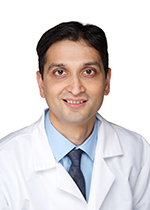The Heart of Machine Learning
A trio of doctors in the MSAI+X program are developing a machine learning model that could help more accurately predict which cardiac patients might suffer a potentially life-threatening post-operative condition.
Roughly three of every 10 patients suffer a sometimes dangerous irregular and rapid heartbeat after cardiac surgery. What’s not known is how to predict which patients will be the three.
A group of doctors that recently graduated from Northwestern Engineering's Master of Science in Artificial Intelligence (MSAI) program is trying to change that.
 The doctors were part of the MSAI+X track, a 12-month full-time program designed for students with advanced degrees who want to bring the tools and techniques of artificial intelligence (AI) into their practices.
The doctors were part of the MSAI+X track, a 12-month full-time program designed for students with advanced degrees who want to bring the tools and techniques of artificial intelligence (AI) into their practices.
Three medical doctors – Hardik Doshi (MSAI '23); Praneet Mylavarapu (MSAI '23), and Tom Liu (MSAI '23) – used their practicum project to help develop an AI model that could predict prior to surgery which patients might be affected by that irregular heartbeat, known as atrial fibrillation.
“Traditional risk factors for development of such an arrhythmia only have a modest predictive power,” Doshi said. “Accurate identification of patients who might develop such an arrhythmia post-procedure can help treating physicians and surgeons plan for such events, modify treatment strategies, and lead to improved outcomes.”
In other words, what the three doctors are developing could save lives.
The MSAI+X program is designed to create exactly those kinds of outsized results. The goal is to provide new skills for students to responsibly develop AI systems. Those students would become something akin to product managers who provide leadership in the development and deployment of new technologies that change lives. It is designed not only for medical doctors but also for PhDs and JDs.
The practicum project is purposefully open-ended, allowing students to focus on an area relevant to their field. That gave Doshi, Mylavarapu, and Liu the opportunity to hone in on cardiovascular medicine and a topic they had encountered in their practices.
“It was great to be able to work on a problem that has actual relevance in medicine,” Liu said. “MSAI helped us to develop some of the skills necessary to do this project and also to be able to design and conduct this research.”
The trio proposed using the standard preoperative electrocardiogram (ECG) patients receive prior to heart surgery to develop a machine-learning (ML) model that could help predict which patients are more likely to be part of the 30 percent who develop atrial fibrillation while recovering.
The first step was for the trio’s model to be able to accurately identify cardiac rhythms from ECGs. The goal then was to have the model learn from the massive dataset of those who do not have a preoperative diagnosis of atrial fibrillation and uncover any similarities that might better help physicians identify the at-risk population.
“This project is still a work-in-progress,” Doshi said. “We have discovered that getting clinical notes can be a daunting task, since our data collection interval spans almost two decades. We expect to have final results on the project in the coming months.”
The project was made easier, however, by the doctors’ previous MSAI coursework. Knowing the type and format of the data they would need allowed them to better prepare their records request, as did their understanding of the power and pitfalls of different types of ML models.
The practicum project structure and the MSAI faculty itself gave the trio more advantages.
“It is absolutely essential to have teamwork for projects of this size and scope. This is especially true since our proposed project sat at the intersection of engineering and medicine,” Doshi said. “Having colleagues and professors who we could readily access for questions and guidance allowed us to avoid some of the common growing pains that come with any project.”
The doctors will be able to carry what they learned during the project and the program back into their practices and use the knowledge to make potentially life-saving changes in their field.
“I plan to apply ML techniques to answer questions in clinical medicine and to come up with new solutions for clinical problems in cardiology,” Doshi said. “Clinical medicine is a data-rich and data-driven science. I expect that ML will provide us a new way to address this data and find new signals that we have yet been unable to identify.”

